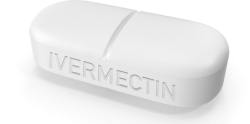Vets are several steps ahead when it comes to ivermectin’s cancer-beating properties
Recently, we have been touching on this theme of ivermectin as a treatment for cancer. So I was delighted to receive an excellent, well-researched piece on precisely this topic from an esteemed colleague. Dr Gérard Maudrux is a urology surgeon based in France and a strident champion for ivermectin. His article gives good insight into ivermectin’s mechanisms of action, while also acknowledging we have yet to discover them all.
I asked if I could share his article with you, and he graciously agreed. If you would like to read the original – in French – you can do so on Dr Maudrux’s blog.
Ivermectin and cancer: reserved for horses?
Dr Gérard Maudrux
Ivermectin is an extraordinary molecule, given its range of actions and safety. Since its discovery it has saved millions of lives, yet health authorities have relegated it to the status of a treatment reserved for horses; this is because medicines which are in the public domain threaten the pharmaceutical industry.
Here is a testimony received from a blog reader eight days ago:
“My wife is coming out of chemotherapy for advanced stage 3 ovarian cancer (the origin of my wife’s cancer is a mutation in the BRCA2 gene); after being assessed in the United States, she was treated with Taxol and Carboplatin.
Having read studies on the PNAS site (NB: Journal of the American Academy of Sciences), that IVM associated with Taxol gave amplified results, I decided to supplement the chemo with 12mg of IVM every other day.
The first scan in July showed a large tumour and damage to the peritoneum. Laparoscopy confirmed the diagnosis. Ca125 marker assay = 288. From the start, I told my wife that COVID was still dragging on and that it would be useful to take ivermectin again, which had protected us from the epidemic, but which we had stopped taking in January.
After 3 chemo sessions (9 weeks), a new scan showed that the tumour was in strong regression with almost no trace on the peritoneum. Surgeon’s comment: it’s remarkable, I didn’t expect that. Ca125 dropped to 22! Operation decision within 15 days.
Uterus and ovaries were removed. Surgeon’s comment: this is extraordinary. No tumour, some dead cells on the peritoneum that I removed. The biopsy confirmed that everything has gone, Ca125 at 3.
The oncologist qualified the result as exceptional but that microscopic cells may remain, and so continued the chemo with Avastin from the 5th session. If I understand correctly, this treatment is to prevent the tumour from generating vessels to feed cancerous cells!!!! What tumour?
I informed them of my complementary “treatment” and shared my sources. Studies have shown that ivermectin restores apoptosis – this was of little interest: “I will look into it”. To this day I’m not sure they’ve done any research.”
Take note: this does not mean that ivermectin necessarily influenced this outcome – it may be a coincidence. Nevertheless this case should stand out, because this cancer is very nasty: peritoneal metastases indicate a very virulent and terminal cancer, with 87% mortality when at this stage, giving little hope.
Unfortunately, medicine as practiced in the 21st century gives this observation no value; it is not a randomized study at the cost of a few million. Moreover, no one will invest, since this molecule, which has fallen into the public domain, cannot be profitable. Observational medicine, which seeks to reproduce a possible discovery, no longer belongs in a world where industrialists and biostatisticians have replaced doctors.
It’s a shame, because ivermectin may have potential for actions that have not yet been explored. Besides its action on almost all parasites, its antiviral action proven by veterinarians and covered up in humans, its anti-inflammatory, immuno-regulatory, anti-cytokine shock action, but also its anti hemagglutination action that can protect against certain vascular side effects of vaccination, it is also clearly an adjuvant that reinforces certain anti-cancer treatments. I have also recently concluded that it is an anti-cancer treatment in its own right. It deserves twice its Nobel Prize.
Veterinarians are more advanced than doctors when it comes to the anti-cancer potential of ivermectin. This article from 2019, notes that ivermectin is more than an adjuvant, it is anti-carcinogenic, inhibiting the growth of mammary tumours in dogs – the most common kind in female dogs and with a poor prognosis. This is both in vitro and in vivo, stopping the growth of tumour cells.
This husband’s curiosity may have saved his wife’s life. It’s a shame that doctors are so unaware: this potential of ivermectin is not a recent discovery. But the authorities have done everything to belittle this extraordinary molecule because it is unprofitable.
In 2017, Santé Log and Top Santé covered a PNAS article referring to a study from the University of Osaka, reporting the anti-tumour effect of ivermectin on cancer cells of epithelial ovarian cancer, interacting with the KPNB1 gene responsible for the disease, with a direct effect on tumour apoptosis (programmed cell death which is the process by which cells trigger their self-destruction in response to a signal). Indeed, the KPNB1 gene behaves like an oncogene and the researchers confirm that its overexpression significantly accelerates the proliferation and survival of tumour cells, while its inhibition induces their apoptosis.
Ivermectin inhibits the activity of KPNB1 and has a synergistic effect combined with paclitaxel (Taxol), a standard drug for the treatment of epithelial ovarian cancer. The authors conclude: “we found that the combination of ivermectin and paclitaxel produces a stronger anti-tumour effect on EOC both in vitro and in vivo than either drug alone.” Taxol is also used in certain bronchopulmonary and breast cancers and in Kaposi’s sarcomas associated with AIDS. The synergy with ivermectin seen in ovarian cancer may be equally beneficial elsewhere.
This article in Pharmacologic Research studies the different mechanisms of action of ivermectin in different cancers, based on 114 studies. It states that “Ivermectin has powerful antitumor effects, including the inhibition of proliferation, metastasis, and angiogenic activity, in a variety of cancer cells…. ivermectin induces programmed cancer cell death, including apoptosis, autophagy and pyroptosis… ivermectin can also inhibit tumour stem cells and reverse multidrug resistance and exerts the optimal effect when used in combination with other chemotherapy drugs.”
They note this apoptosis with cells of ovarian cancer, colorectal, kidney, glioblastoma and leukaemia. Autophagy affects glioma, lung cancer and melanoma, and pyroptosis affects lung cancer cells.
Other articles study the action of ivermectin in colorectal and prostate cancer. Studies are underway for an injectable form of ivermectin, on breast, lung, bladder and melanoma cancers. Another notable work is a 2021 book on the repurposing of old molecules. The chapter on ivermectin recounts a number of experiments carried out on all these cancers.
Besides these potential effects on cancers, let’s not forget this other discovery from five years ago: remyelination, opening up avenues in the treatment of multiple sclerosis (here and here). Ivermectin has not finished surprising us.
Unfortunately for all of these applications, we will not see studies that lead to marketing authorization. Indeed, what is ivermectin at a dollar a tablet worth compared to treatments at a few thousand euros promoted by the major pharmaceutical groups?
As for medics who would prescribe this drug, knowing there are no harmful side effects even in the case of it not working, they will nevertheless be prosecuted. Rules are rules, it seems, and patients’ wellbeing is secondary.
Medicine is not moving in the right direction. Doctors don’t tend to like patients coming and asking for this or that examination or treatment, because they “saw it on the internet”. But if the doctors have thrown in the towel, surely this means someone else has to step up to the plate? It was not this husband’s job to read the medical articles that doctors should have read, but he was right to do so. I can’t help but liken this to reports of vaccine-related adverse events. In pharmacovigilance records, there are almost as many withheld statements made by patients as by health professionals.
It is not the role of patients and families to research treatments and report on their findings, but that of health professionals, many of whom seem to be AWOL. If we continue like this, in future it will be the patients treating the health providers! In the meantime, at least the horses will be well cared for.
Thank you for your support.
If you find value in these articles, please consider becoming a paid subscriber to this Substack. Your financial support is very much appreciated by me and the WCH Team.



